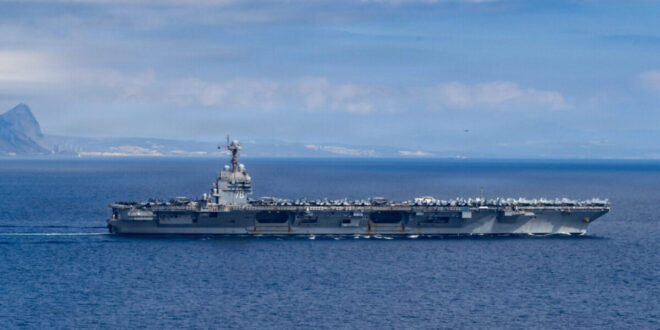Christopher McCallion
Regime change in Venezuela would contradict the Trump administration’s border and regional security priorities.
President Donald Trump’s administration is putting increasing military pressure on the Venezuelan government of Nicolás Maduro, sending an unmistakable signal that the United States wishes to see the Venezuelan strongman ousted.
The Trump administration has put a $50 million bounty on Maduro’s head, killed scores of people in airstrikes on boats in the Caribbean and Pacific, moved naval and aerial assets into the region, and authorized covert actionwhile considering land strikes inside Venezuela. In a recent interview,Trump told 60 Minutes that Maduro’s days are numbered.
This is more than “gunboat diplomacy,” not least because the Trump administration’s demands appear to be unconditional and uninterested in diplomacy. Maduro already offered Trump preferential deals on his nation’s oil wealth—the largest proven reserves in the world—and reportedly even floated a voluntary transition out of power in three years.
While the Trump administration had initially been negotiating successfullywith Maduro through Special Envoy Rick Grenell, the balance of power within the White House has shifted in favor of Secretary of State and National Security Advisor Marco Rubio. The son of Cuban emigres from Florida and a well-known hawk, Rubio has long favored violent regime change in Caracas.
Clearly, the “narco-terrorist” rationale for attacking Venezuela doesn’t hold water. Virtually all of the fentanyl entering the United States comes from Mexico, while the overwhelming majority of cocaine comes from Colombia, Peru, and Bolivia. Overthrowing Maduro and murdering random people in the Caribbean will have no noticeable effect in stemming the flow of illicit drugs into the United States—and it is hard to believe the White House expects it to.
Related Articles
The administration appears to think it can topple Maduro’s government on the cheap, using a mix of naval and air power and covert means, while relying on the political opposition and defectors from the military to take control on the ground. If this sounds familiar, it is: Trump is adopting the same failed regime change framework that Washington has followed repeatedly over the past few decades—in Iraq, Afghanistan, Libya, and Syria—with disastrous results.
As is frequently the case in foreign regime-change wars, there is no guarantee that an alternative government can take power and impose stability. Previous coup attempts in Venezuela showed that Maduro maintains the loyalty of the military, and has been “coup-proofing” its ranksever since. More likely than a neat decapitation of the government is a Libya-like fracture and subsequent descent into anarchy as armed groups contend for control.
This scenario would not only spill violence and refugees into neighboring countries but could increase the pressure on Trump to send in US troops to stabilize the situation. There is also the non-negligible risk of retaliatory or opportunistic violence targeting US citizens in Latin America or even within the United States.
The fallout from an armed overthrow of Maduro will also likely send many more refugees to the United States. At the same time, the administration is cracking down hard on immigration. As a result, Trump would be undermining his core domestic priority of border security and immigration control in exchange for exactly the kind of unnecessary regime change war that he frequently campaigned against. The frightening domestic fissures in the United States resulting from ICE raids across the country make the prospect of an additional refugee crisis worrying for the stability of American society itself.
Moreover, US military aggression against Venezuela will only increase the threat other countries in the region perceive from Washington, incentivizing them to look to outside great powers for protection. Caracas has already reached out to Russia and China for military support. Trump has made a point in his second administration of harassing Washington’s neighbors—threatening to annex Greenland, make Canada the “51st state,” and send troops into Mexico; calling the Colombian president an “illegal drug leader”; and levying politically motivated sanctions against Brazil.
Using the US military to change the regime in Venezuela is all downside and no upside, contradicting everything Trump’s supporters voted for under the banner of “America First.” It will neither ameliorate the nation’s drug problem nor make Americans safer; on the contrary, it will divert resources needed elsewhere into a senseless conflict that will, if anything, undermine American security in our own backyard.
About the Author: Christopher McCallion
Christopher McCallion is a fellow at Defense Priorities. McCallion focuses on issues in grand strategy, IR theory, US foreign policy, and technological competition. His work has appeared in Politico, Newsweek, The National Interest, and CNN, among others. He was formerly an adjunct lecturer in political science at Hunter College, City University of New York, and holds an MSc in Theory and History of International Relations from the London School of Economics and Political Science.
Related Articles
 Geostrategic Media Political Commentary, Analysis, Security, Defense
Geostrategic Media Political Commentary, Analysis, Security, Defense






